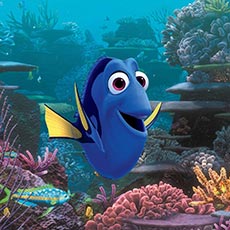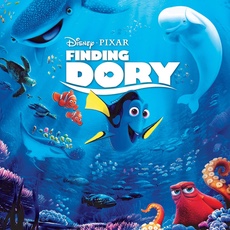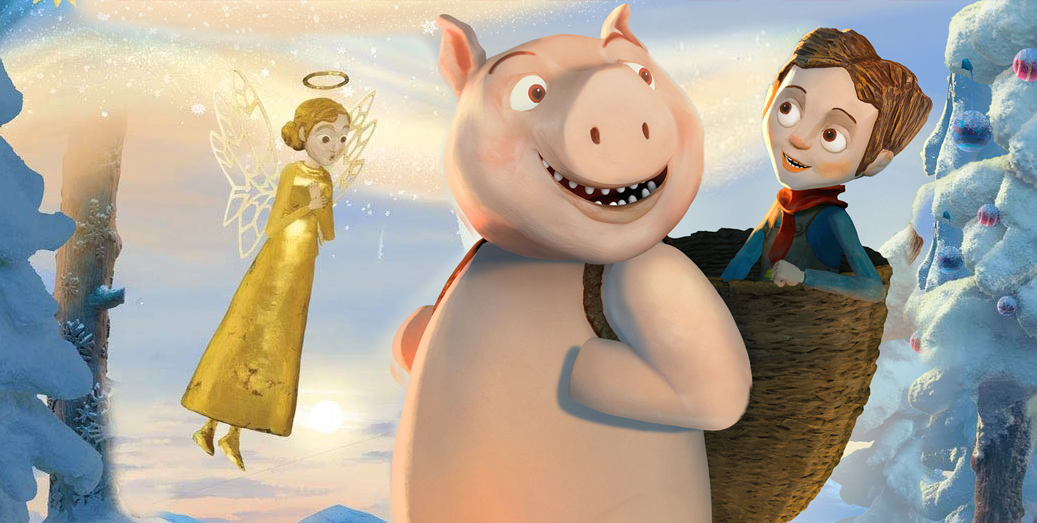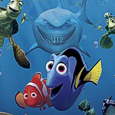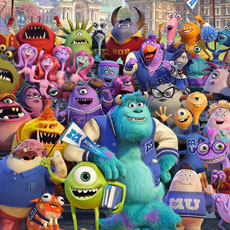Pixar’s Finding Nemo was released thirteen years ago. It was the studio’s biggest hit at the time, earning over $300 million. Only two other Pixar films have reached that milestone in the years since, seven and twelve years after Nemo did it. Adjusted for inflation, the movie is still Pixar’s biggest box office winner. An incredible twelve of the studio’s seventeen films have earned 90% or better at Rotten Tomatoes, and Finding Nemo is near the top of that prestigious list with a 99% rating. So with the Disney-led push for more follow-up titles it was inevitable that a sequel would be forthcoming.
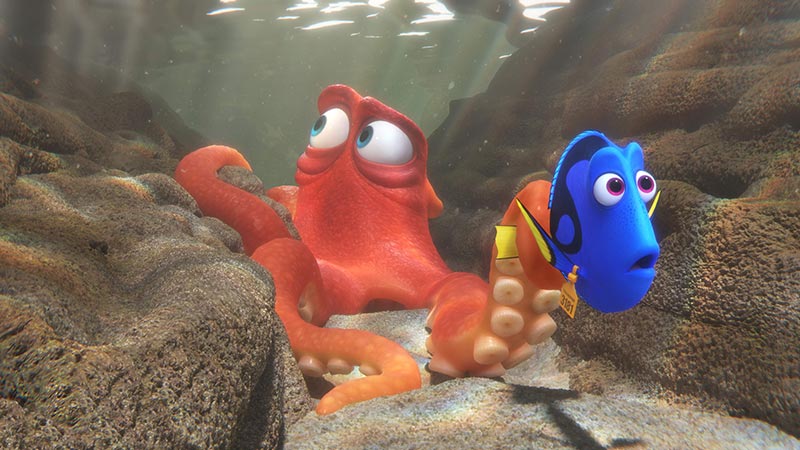 Fandom seems to have a weird relationship with Pixar and sequels. From any other studio sequels are not just expected but accepted and indiscriminately supported. The top animated film of all time is Shrek 2, and the top ten includes Despicable Me 2, Minions, and Shrek the Third. Looking further down the list finds Ice Age, How To Train Your Dragon, Madagascar, SpongeBob, and Hotel Transylvania sequels. Why do we gobble up every thing those other studios throw at us but roll our collective eyes when Pixar announces a sequel?
Fandom seems to have a weird relationship with Pixar and sequels. From any other studio sequels are not just expected but accepted and indiscriminately supported. The top animated film of all time is Shrek 2, and the top ten includes Despicable Me 2, Minions, and Shrek the Third. Looking further down the list finds Ice Age, How To Train Your Dragon, Madagascar, SpongeBob, and Hotel Transylvania sequels. Why do we gobble up every thing those other studios throw at us but roll our collective eyes when Pixar announces a sequel?
What makes it all the more unfathomable is that Pixar has a pretty good track record with follow-up films. Toy Story 2 won the Golden Globe award for Best Picture. Toy Story 3 was nominated for an Academy Award for Best Picture. Cars 2 wasn’t a critical success but brought in over half a billion dollars at the box office (and countless more in toy sales). And Monsters University has the fourth highest worldwide gross of any Pixar film while earning almost 80% on the Tomatometer. It does’t make much sense logically! The only thing I can think that drives this way of thinking is that Pixar’s only film that didn’t earn more than 70% with the critics was a sequel, which for some reason overshadows how well the other sequels have done. Or maybe the Pixar originals are so good fans want them to spend more time doing those. Whatever it is, Pixar has five movies on their upcoming slate, four of which are sequels. So be prepared for more hand-wringing despite evidence to the contrary that it may not be warranted.
First up is Finding Dory. Where does it stand on the Pixar scale of sequels? One of the best animated films of all time, widely liked by critics and fans, or panned but popular? (Not a bad scale to start from if you ask me!) Let’s not drag out the answer. Finding Dory is a more than worthy successor to the original. In fact, this film could probably even stand on its own without having seen the first movie. But everything fans loved about Nemo can be found in this film. And the sequel even surpasses it in one big way.
Finding Dory follows the standard sequel philosophy of flipping the original script — instead of a parent searching for their child we get a child searching for their parents. While it was easy to understand what was driving Marlin in the first film, having a character here who can’t remember their past would seem to put a big stumbling block in the way of motivation! The writers get around this in an obvious way but it is very well executed. That’s going to be a theme here. Nothing about the film is groundbreaking, but everything is done so well that who cares about how it was put together.
The “buddy team on a journey filled with a series of unfortunate events” template from Finding Nemo is followed almost note for note. The main difference is our team gets split up part way through and we start following two groups. Dory is teamed with a grouchy octopus while Marlin is with Nemo. Having Dory interact with someone very different from Marlin is a fun switch-up. And seeing Marlin have to put the lessons he learned in the first film into action is a nice follow-through.
Perhaps the biggest difference between the two films is Finding Dory is extremely funny. Don’t get me wrong, Finding Nemo was fun, but the humor was a lot more of the gentle variety — a smile here, a giggle there. Here, the laughs are loud and almost non-stop. Is that better? I would say you can’t compare. Nemo’s humor worked well with that story. And the jokes here work well with this story.
You might read that and come to the conclusion that the Nemo story has a bigger heart. And that might be fair. But only because the plot of Nemo required the characters to be a little more desperate — a father looking for his just kidnapped son. In Dory, there isn’t as much of a need for speed. Dory is looking for her parents but there really is no rush. And because of the lack of desperation the story can take the time to laugh. That’s not to say there is no emotional pull to the plot. This film will bring on the waterworks as easily as any other Pixar film! I’d actually argue that the heartstrings get pulled more here than in Finding Nemo. In that film the emotion comes from the lengths that a dad goes through to get his son back, but in the end Marlin’s son is only missing for a week or so. In this movie, Dory has been gone for years. And we see the heartbreaking (and tear-inducing!) ordeal her family has been through in their quest to find a missing daughter with no memory of them.
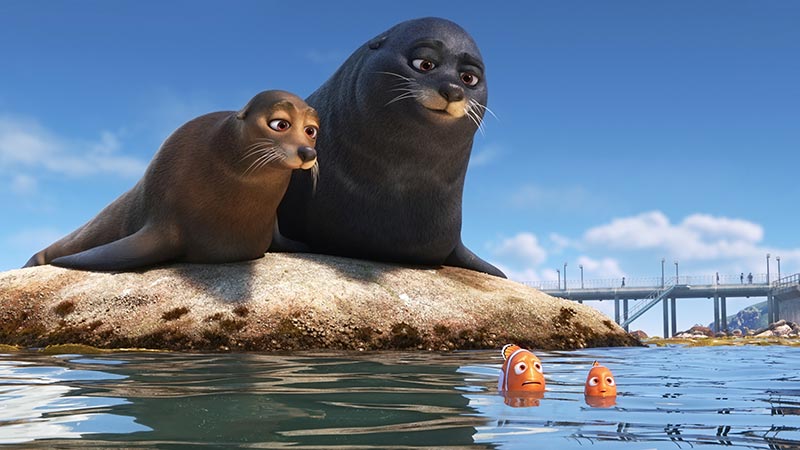 As good as the story is there was one major issue that bothered me. Yes, these are talking fish so a suspension of disbelief is required! The original film did a fine job of not stretching that suspension of disbelief beyond its breaking point. Here that self-restraint is gone. Throughout the film the characters do some fairly crazy things that strain the boundaries of belief the world has set. But it is mostly forgivable since so much of it is in the name of fun. But the end of the film broke all such boundaries in a frenzy of outrageous and far-fetched antics that were beyond belief even in this talking fish world. The movie would have been so much better ending even five minutes sooner than it did with a less farcical finale.
As good as the story is there was one major issue that bothered me. Yes, these are talking fish so a suspension of disbelief is required! The original film did a fine job of not stretching that suspension of disbelief beyond its breaking point. Here that self-restraint is gone. Throughout the film the characters do some fairly crazy things that strain the boundaries of belief the world has set. But it is mostly forgivable since so much of it is in the name of fun. But the end of the film broke all such boundaries in a frenzy of outrageous and far-fetched antics that were beyond belief even in this talking fish world. The movie would have been so much better ending even five minutes sooner than it did with a less farcical finale.
While Finding Nemo still looks amazing even after a decade, animation techniques have improved since then. But the world of Dory feels very much true to the original while also looking better than ever. Like Finding Nemo, this will be a reference quality title for home theatre enthusiasts when it hits home video. New character designs were more disappointing. A shape-shifting octopus named Hank is the stand-out. But Dory’s parents and two whale pals are bland at best. Designing memorable fish must be hard, especially if they’re supposed to be related. But the first film seemed to have a much more fun and diverse looking cast of characters.
Thomas Newman’s score gets a little lost in the action and humor of this film. His music for the original is so iconic that it’s not fair to compare it to the sequel. But it definitely complements the original while standing on its own. (On a side note, can we get the poor man an Oscar already? Maybe not for this film, but c’mon! With thirteen nominations and zero wins he is the third most nominated living person to have never won!)
Pixar knocked it out of the park with their casting of this film. Obviously Ellen DeGeneres and Albert Brooks return as Dory and Marlin — maybe Pixar’s best acting duo, which is saying a lot with Tom Hanks and Tim Allen from Toy Story and John Goodman and Billy Crystal from Monsters Inc. on that list! But the newcomers are almost all amazing as well. Ed O’Neill, as Hank the octopus, is more than up to the challenge of supporting the star of the film in his scenes with DeGeneres. Ty Burrell is hysterical as a beluga whale named Bailey. Diane Keaton and Eugene Levy give Dory’s parents a believable and sincere bearing that fits the couple with a disabled child just right. Idris Elba and Dominic West voice a pair of fun sea lions. Another voice almost steals the show but I don’t want to spoil anything by mentioning it. You’ll know it when you hear it!
I just don’t understand how people line up for every Ice Age, Minion, or Madagascar follow-up without question, but still have doubts about one from a studio with an almost unblemished track record like Pixar’s. Finding Dory is the kind of sequel we want: a great story, relatable characters, lots of humor, real emotions, beautiful animation and music, and top-notch acting. Pixar films, whether original or sequels, are much more often than not unforgettable events that should have animation fans hooked and craving more.
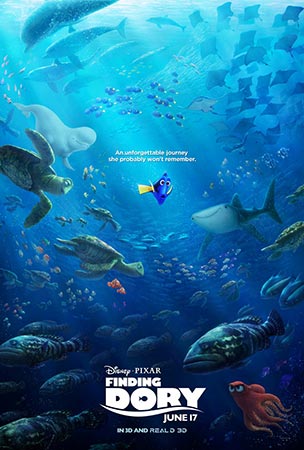 | Finding Dory Disney, Pixar June 17, 2016 103 minutes Rated PG directed by Andrew Stanton | |


